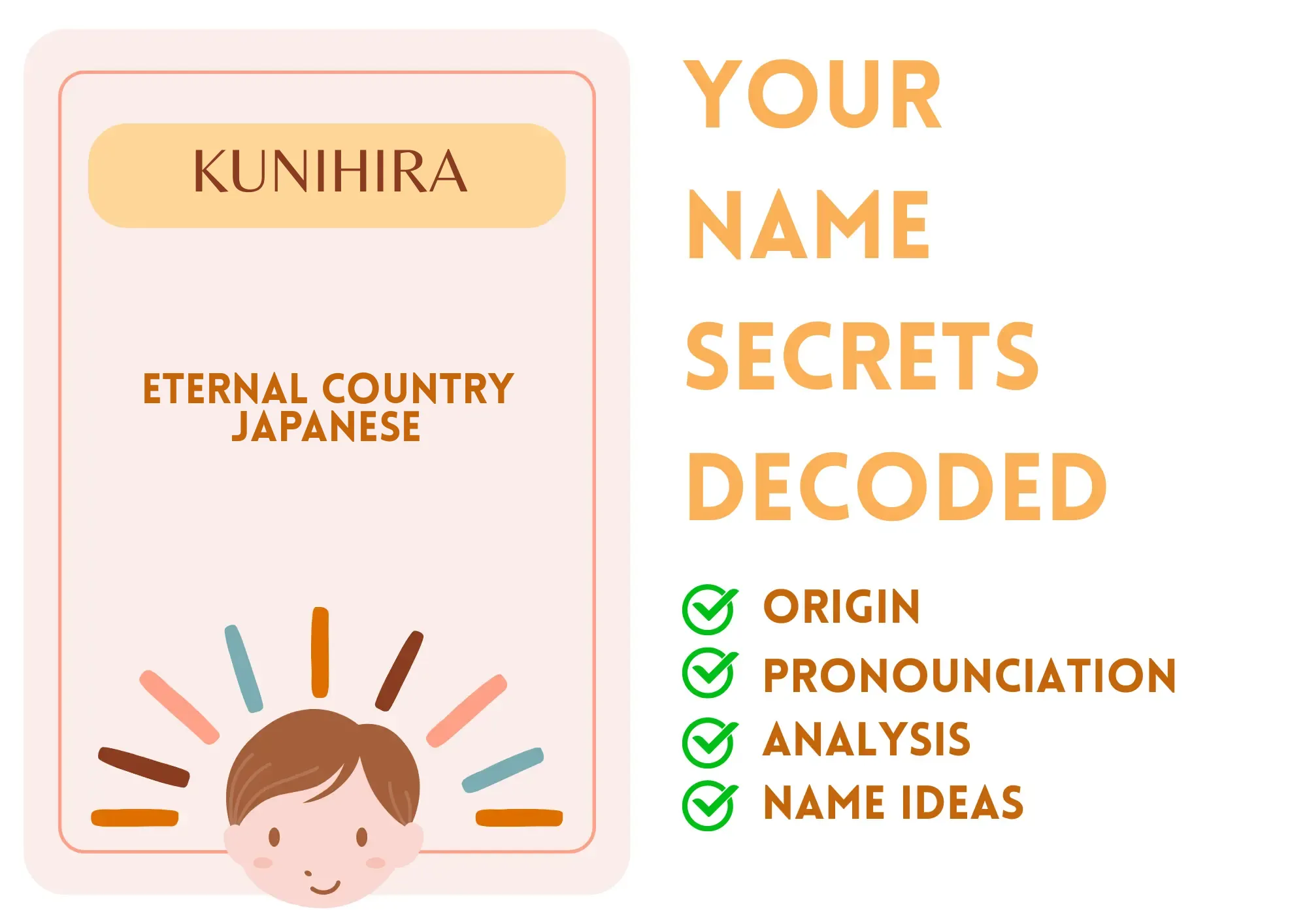
Kunihira
Kunihira is a unique name with Japanese origins, where it is composed of characters that can mean 'eternal' or 'country' and 'to be' or 'to wear'. This name carries a connotation of stability and permanence, often reflecting qualities of endurance and commitment. It is predominantly used as a masculine name within Japan, though it has unisex potential in other cultures due to its melodic sound.
Culturally, this name encapsulates aspects of Japanese aesthetics and tradition, embodying a deep respect for heritage and family lineage. Although less common outside Japan, its distinctive sound and meaning add an air of uniqueness to it.
Kunihira is generally well-received, evoking thoughts of strength and timelessness. With its ease of phonetic spelling, it offers an uncomplicated approach to writing and calling. Common nicknames would include Kuni or Hira. The name, while not widely recognized in popular culture, holds its charm in its rarity and depth.
Basic Information
Gender: Boy
Sounds Like: koo-nee-hee-rah
Pronunciation Explanation: The name is pronounced with emphasis on the first syllable 'koo', followed by 'nee', a soft 'hee', and ending with 'rah'.
Summary and Meaning
Meaning: eternal country (Japanese)
Origin: The name Kunihira originates from Japan, associated with the Japanese language and culture.
Usage: Kunihira is traditionally regarded as a masculine name but can be seen as unisex in a broader context.
Name Number (Chaldean)
Name Number (Pythagorean)
Popularity (Global Rank)
Overall: 165043
Boys: 72681
Most Popular in
Religious and Cultural Significance
Religion: Shinto
Background: Kunihira aligns closely with Shinto beliefs, which emphasize harmony with nature and respect for one's ancestors.
Cultural Significance: In Japanese culture, the name reflects a sense of national pride and familial fidelity, making it a revered choice for boys.
Historical Significance: In Japanese history, names often held value in familial connections and cultural attributes, and Kunihira can represent a lineage that appreciates the permanence of heritage.
Popular Culture
Literature and Mythology: While Kunihira may not be explicitly noted in major literary works, its phonetic elements are reminiscent of traditional Japanese storytelling.
Movies and Television: Characters bearing the name Kunihira may appear in independent films or shows that celebrate Japanese culture and themes of tradition.
Feelings and Perceptions
Perception: Most people find Kunihira to be a strong and unique name. It conveys an image of reliability and a lasting legacy.
Positive Feelings: Unique, strong, dependable, connected to heritage, timeless.
Negative Feelings: Possibly unfamiliar to those outside the Japanese culture; pronunciation may need clarification.
Practical Considerations
Ease of Writing and Calling: Kunihira is moderately easy to write and pronounce. While it is longer than many names, its phonetic spelling aids in comprehension.
Common Typos and Misspellings: Kunihera,Kunihra,Kunihiraah,Kunihra
Common Nicknames: Kuni,Hira,Nihira
Kunihira Popularity
Kunihira Usage and Popularity By Country
| Country | Rank (Overall) |
|---|---|
| Uganda | 1172 |
| Iraq | 7766 |
| Iceland | 8499 |
| Japan | 16713 |
Kunihira Usage and Popularity By City
| City | Rank (Overall) |
|---|
Compatibility Analysis
Famous Persons Named Kunihira
No results found for Kunihira.
Related Names
Similar Sounding Names:
Kazuhiro,Hiroshi,Kuniyoshi,Kentarou
Similar Meaning and Related Names:
Sibling Name Ideas (Brothers):
Sibling Name Ideas (Sisters):
Emi ♀️
N/A